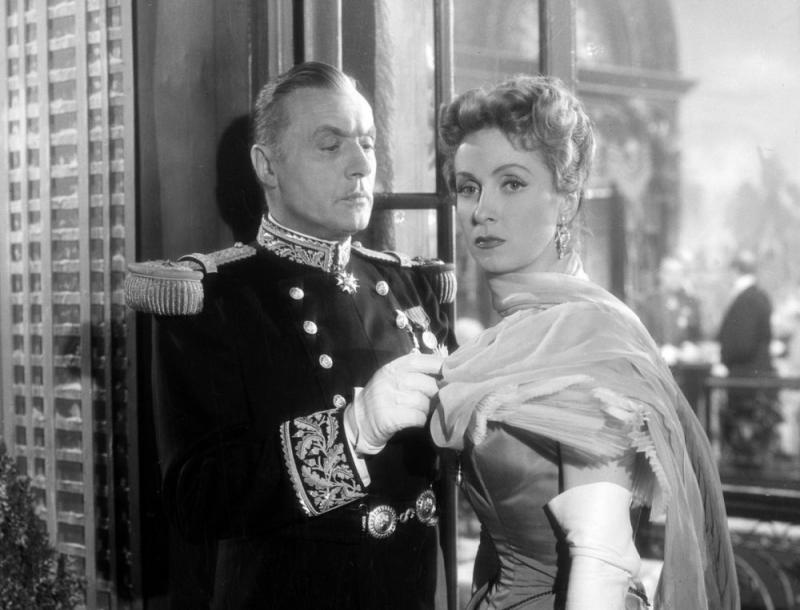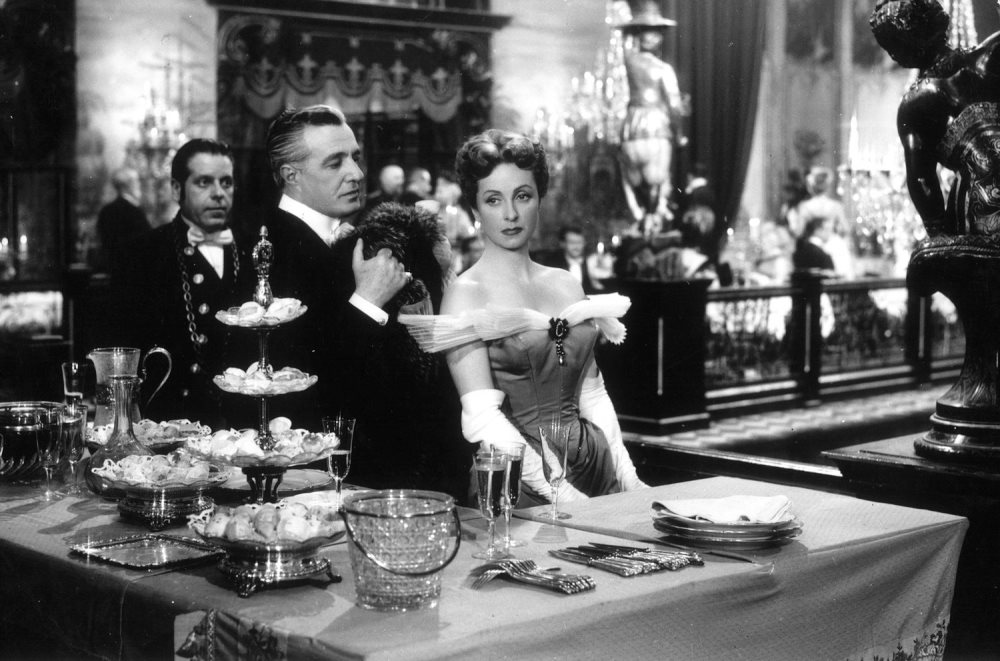DVD/Blu-ray: Madame de… | reviews, news & interviews
DVD/Blu-ray: Madame de…
DVD/Blu-ray: Madame de…
Unexpected passions win out in Max Ophüls’ landmark drama of the heart

Initially, Madame de… feels as if it might wear out its welcome. What seems a wearisome exposition on how privileged people with too much time on their hands fill their hours with vacuity gradually turns into an incisive discourse on the power of the emotions behind the facades fashioned for polite society. Towards the end, it’s clear that even the most seemingly shallow of people can be swayed by unexpected passions. And at the end: blam, an astonishingly powerful pay-off.
Reviewing Madame de… in 1954, when it was released in the UK as The Earrings of Madame de…, Lindsay Anderson (whose review is reprinted in full in this new package’s booklet) said that “in all [its] visual frou-frou, it is not surprising that the characters become lost and the interior development of their drama is almost completely unobserved.” What’s clear, and was seemingly unclear to Anderson, is that going with the flow is essential to appreciating Madame de…
 Max Ophüls directed the film after returning to France from America, where he had been after the start of World War Two until 1950. It was the third feature he made once back in Europe, following La Ronde (1950) and La Plaisir (1952). Drawing from the 1951 book by Louise Lévêque de Vilmorin, Madame de… has some similarities with La Ronde as a cyclic tale. The never fully named Madame (Danielle Darrieux) sells her earrings to pay for debts. A wedding gift from her husband, a count and general (Charles Boyer), they are repeatedly sold on and end up being bought by the man who becomes her lover, the Italian diplomat Fabrizio Donati (Vittorio De Sica). As a plot device, the earrings symbolise transience and transition, and are also a symbol of power: her husband knows how they have come back and uses them as punishment.
Max Ophüls directed the film after returning to France from America, where he had been after the start of World War Two until 1950. It was the third feature he made once back in Europe, following La Ronde (1950) and La Plaisir (1952). Drawing from the 1951 book by Louise Lévêque de Vilmorin, Madame de… has some similarities with La Ronde as a cyclic tale. The never fully named Madame (Danielle Darrieux) sells her earrings to pay for debts. A wedding gift from her husband, a count and general (Charles Boyer), they are repeatedly sold on and end up being bought by the man who becomes her lover, the Italian diplomat Fabrizio Donati (Vittorio De Sica). As a plot device, the earrings symbolise transience and transition, and are also a symbol of power: her husband knows how they have come back and uses them as punishment.
In the three stunning lead performances there is a powerful balance of aloofness and intensity. Ophüls steers his cast through lengthy tracking shots which often turn the film into a lustrous theatre piece. For its technical achievements alone, Madame de… is worth visiting. But it is so much more than an exercise.
This new dual-format DVD/Blu-ray BFI release uses a fresh high-definition transfer from the original negative, rather than the master employed by the 2013 Criterion Collection edition. Comparatively, the new transfer has deeper black-and-white toning and more foregrounded dialogue. While the Criterion commentary track and introduction by Paul Thomas Anderson are not reused, the British package has two unique extras (an hour-long 2013 documentary, and a half-hour interview with Ophüls associate Alain Jessua) and a booklet stuffed with appreciations and essays.
rating
Explore topics
Share this article
The future of Arts Journalism
You can stop theartsdesk.com closing!
We urgently need financing to survive. Our fundraising drive has thus far raised £49,000 but we need to reach £100,000 or we will be forced to close. Please contribute here: https://gofund.me/c3f6033d
And if you can forward this information to anyone who might assist, we’d be grateful.

Subscribe to theartsdesk.com
Thank you for continuing to read our work on theartsdesk.com. For unlimited access to every article in its entirety, including our archive of more than 15,000 pieces, we're asking for £5 per month or £40 per year. We feel it's a very good deal, and hope you do too.
To take a subscription now simply click here.
And if you're looking for that extra gift for a friend or family member, why not treat them to a theartsdesk.com gift subscription?
more Film
 Sorry, Baby review - the healing power of friendship in the aftermath of sexual assault
Eva Victor writes, directs and stars in their endearing debut feature
Sorry, Baby review - the healing power of friendship in the aftermath of sexual assault
Eva Victor writes, directs and stars in their endearing debut feature
 Blu-ray: Who Wants to Kill Jessie?
Fast-paced and visually inventive Czech comedy
Blu-ray: Who Wants to Kill Jessie?
Fast-paced and visually inventive Czech comedy
 Oslo Stories Trilogy: Love review - freed love
Gay cruising offers straight female lessons in a heady ode to urban connection
Oslo Stories Trilogy: Love review - freed love
Gay cruising offers straight female lessons in a heady ode to urban connection
 Beating Hearts review - kiss kiss, slam slam
Romance and clobberings in a so-so French melodrama
Beating Hearts review - kiss kiss, slam slam
Romance and clobberings in a so-so French melodrama
 Materialists review - a misfiring romcom or an undercooked satire?
Writer-director Celine Song's latest can't decide what kind of film it is
Materialists review - a misfiring romcom or an undercooked satire?
Writer-director Celine Song's latest can't decide what kind of film it is
 theartsdesk Q&A: actor Leonie Benesch on playing an overburdened nurse in the Swiss drama 'Late Shift'
The Guildhall-trained German star talks about the enormous pressures placed on nurses and her admiration for British films and TV
theartsdesk Q&A: actor Leonie Benesch on playing an overburdened nurse in the Swiss drama 'Late Shift'
The Guildhall-trained German star talks about the enormous pressures placed on nurses and her admiration for British films and TV
 Freakier Friday review - body-swapping gone ballistic
Lindsay Lohan and Jamie Lee Curtis's comedy sequel jumbles up more than their daughter-mother duo
Freakier Friday review - body-swapping gone ballistic
Lindsay Lohan and Jamie Lee Curtis's comedy sequel jumbles up more than their daughter-mother duo
 Eight Postcards from Utopia review - ads from the era when 1990s Romania embraced capitalism
Radu Jude's documentary is a mad montage of cheesy TV commercials
Eight Postcards from Utopia review - ads from the era when 1990s Romania embraced capitalism
Radu Jude's documentary is a mad montage of cheesy TV commercials
 The Kingdom review - coming of age as the body count rises
A teen belatedly bonds with her mysterious dad in an unflinching Corsican mob drama
The Kingdom review - coming of age as the body count rises
A teen belatedly bonds with her mysterious dad in an unflinching Corsican mob drama
 Weapons review - suffer the children
'Barbarian' follow-up hiply riffs on ancient fears
Weapons review - suffer the children
'Barbarian' follow-up hiply riffs on ancient fears
 theartsdesk Q&A: filmmaker Dag Johan Haugerud on sex, love, and confusion in the modern world
The writer-director discusses first-love agony and ecstasy in 'Dreams', the opening UK installment of his 'Oslo Stories' trilogy
theartsdesk Q&A: filmmaker Dag Johan Haugerud on sex, love, and confusion in the modern world
The writer-director discusses first-love agony and ecstasy in 'Dreams', the opening UK installment of his 'Oslo Stories' trilogy

Add comment